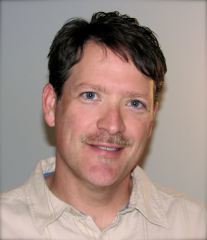I have a photo on the hard drive of my MacBook taken June 30, 2008, near Apalachicola, Florida. It is a picture of Florida Fish and Wildlife Commission biologist Adam Warwick, and his swimming partner: A 375-pound male black bear. Yes, there are bears in Florida (as if poisonous snakes, alligators, and disease-bearing mosquitos were not enough of a threat).
The bear had been wandering the local neighborhoods, eating out of garbage cans, and terrifying little old ladies, small children, and tourists. So the Wildlife Commission showed up with their dart guns to relocate this beautiful creature where both he and humans would enjoy greater safety.
But before the tranquilizer could take effect, the bear jumped into Alligator Bay with every intention, it appears, to swim to the barrier islands where he would be unbothered by dart guns and meddling biologists. Twenty-five yards from shore, however, the drugs hit the poor bear’s brain, and he began to struggle. It was then that Warwick stripped down to his skivvies and jumped in to save the bear from drowning.
Like a “lifeguard dragging a tired swimmer,” Adam brought the animal to shore where the bear made a full recovery and was ultimately relocated to Osceola National Forest. Why did Warwick intervene like this, when other onlookers said they would have never attempted such a thing?
Because it was his job. More so, it was because he cared. It simply would have been wrong to let the animal drown, especially when it was human intervention that endangered the animal in the first place. Likewise, it is wrong to let God’s good creation “drown,” when so many of the environmental disasters of our day are directly caused by human foolishness, greed, and irresponsibility.
Some readers may think it strange to bring up ecology in a “faith” column, seeing the subject as misplaced. Nothing could be further from the truth. The charge to be responsible defenders of the earth is found in the origins of our faith — the book of Genesis — where God, “in the beginning,” commanded humanity to keep and care for creation.
That primal image is one of a gardener, implanted into a living biosphere, with a divine assignment, the first and oldest commandment: Be good stewards and managers of all God has made. Like fair and noble monarchs (the magnanimous wording found in Genesis 1), we are to serve and protect what God has placed within our realm.
Honorable management does not extend to exploitation or abuse; to the wringing out of every drop of resource; or to conduct practices akin to scorched earth policy; or to acquire as much wealth, territory, and dominance as possible at the expense of the earth and the future.
Cultivating, protecting, and loving creation — taking care of the planet God has given us — is a deeply basic, spiritual act. We would all do well to follow Adam Warwick’s sterling example: Jump in, with gusto, and not allow what God has made to sink.
Ronnie McBrayer is a syndicated columnist, blogger, pastor, and author of multiple books. Visit his website at www.ronniemcbrayer.net.


